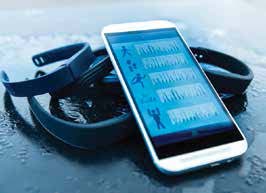
How many steps did you walk today? How far did you go? How efficiently did you exercise? What was your pulse rate? How many calories did you burn? How much sleep did you get? Many people find tracking this kind of information invaluable for keeping their workout routine on target. And there are many different electronic devices available to track your every move throughout the day.
You may choose from dozens of fitness trackers with a wide range of features. Some combine fitness tracking with smartwatch functionality and plenty of bells and whistles, while others offer basic statistics. All fitness trackers collect and record various information about what your body has done, allowing you to translate your exercise into solid numbers.
Before you purchase a fitness tracker, do a little research to make sure it meets your needs. If you like a particular activity, such as swimming, find a tracker with software designed for it. If you’re a former couch potato just looking to get up and move more, a basic tracker that records steps and calories may be all you need. If you lead a more active life, you may want a device with more advanced features, such as heart rate monitoring or distance tracking through a GPS receiver.
Monitoring all that arm and leg movement doesn’t have to cost you an arm and a leg. While top-of-the-line models can carry a sticker price of $800 or more, you can get a simple fitness tracker for as little as $25. Most trackers fall into the $50 to $300 range. Realistically evaluate what you need from a fitness tracker, and balance that with what you can afford to pay.
In the end, all a fitness tracker can do is record how much activity you have done and how efficiently you did it. It can’t increase your activity level or improve your performance—but it can motivate you. We can help you develop an individualized exercise program that meets your needs and helps you attain your goals—whether you use a fitness tracker or not.
















